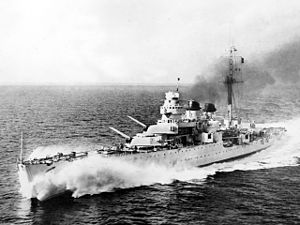Italian cruiser Luigi di Savoia Duca degli Abruzzi
 From Wikipedia the free encyclopedia
From Wikipedia the free encyclopedia
This article includes a list of general references, but it lacks sufficient corresponding inline citations. (June 2023) |
 Luigi di Savoia Duca Degli Abruzzi during sea trials (1938) | |
| History | |
|---|---|
| Name | Luigi di Savoia Duca Degli Abruzzi |
| Namesake | Prince Luigi Amedeo, Duke of the Abruzzi |
| Builder | O.T.O., La Spezia |
| Laid down | 28 December 1933 |
| Launched | 21 April 1936 |
| Commissioned | 1 December 1937 |
| Decommissioned | January 1961 |
| Refit | 1953 |
| Fate | Scrapped 1972 |
| General characteristics | |
| Class and type | Duca degli Abruzzi-class cruiser |
| Displacement |
|
| Length | 171.1–187 m (561–614 ft) |
| Beam | 18.9 m (62 ft) |
| Draught | 6.9 m (23 ft) |
| Propulsion |
|
| Speed | 34 knots (63 km/h; 39 mph) (62 km/h) |
| Range | 4,125 nmi (7,640 km; 4,747 mi) at 13 kn (24 km/h; 15 mph) |
| Complement | 640 |
| Armament |
|
| Armour |
|
| Aircraft carried | 4 x Ro.43 |
Luigi di Savoia Duca degli Abruzzi was an Italian Duca degli Abruzzi-class light cruiser, which served in the Regia Marina during World War II. After the war, she was retained by the Marina Militare and decommissioned in 1961. She was built by OTO at La Spezia and named after Prince Luigi Amedeo, Duke of the Abruzzi, an Italian explorer and Admiral of World War I.
Design
[edit]The Duca degli Abruzzi-class cruisers were the final version of the Condottieri class and were larger and better protected than their predecessors. The armament was also increased by two extra 152 mm guns, triple turrets replaced twins in the "A" and "Y" positions thus making them the most heavily armed light cruisers of Italy during World War II. The machinery was also revised which led to these ships having a slightly slower maximum speed than their predecessors.
Career
[edit]World War II
[edit]The ship was completed in 1937 and formed the 8th Cruiser division with her sister ship Giuseppe Garibaldi. She fought in the following actions:
- Battle of Calabria, where she led a squadron of light cruisers which fired the first salvoes of the battle
- 1 September 1940: Part of the fleet that attempted to intercept the convoy Hats
- Battle of Cape Matapan
- 24 September 1941: Part of the fleet that attempted to intercept the convoy Halberd headed for Malta.
Damaged by an aircraft torpedo on 22 November 1941 but repaired, she was interned by the Allies after the Italian Armistice and later served with the Italian Co-Belligerent Navy in the South Atlantic on operations against potential German raiders.
Post war
[edit]After 1945, her torpedo launchers were removed and replaced by two 4 inch anti-aircraft guns. Since 1953 she was equipped with an AN/SPS-6 2D air search radar.[1]
In late 1953, during the negotiations which ended in the handover of Trieste to Italy, the cruiser was transferred from Taranto to Venezia, in order to strengthen the Italian position at the bargaining table.[2] Eventually, on 26 October 1954, Duca degli Abruzzi was the flagship of the Italian naval force which took possession of Trieste's port facilities.[3] She served in the post war Marina Militare until 1961.[1]
Notes
[edit]- ^ a b Marina Militare website (in Italian)
- ^ Malgeri, Francesco (2002). La stagione del centrismo: politica e società nell'Italia del secondo dopoguerra : 1945-1960. Rubbettino, p. 152. ISBN 88-498-0335-4 (in Italian)
- ^ Trieste torna all'Italia (26 Ottobre 1954) Archived 2011-03-08 at the Wayback Machine by Riccardo Basile (in Italian)
References
[edit]- Brescia, Maurizio (2012). Mussolini's Navy: A Reference Guide to the Regina Marina 1930–45. Annapolis, Maryland: Naval Institute Press. ISBN 978-1-59114-544-8.
- Chesneau, Roger, ed. (1980). Conway's All The World's Fighting Ships 1922–1946. London: Conway Maritime Press. ISBN 0-85177-146-7.
- Fraccaroli, Aldo (1968). Italian Warships of World War II. Shepperton, UK: Ian Allan. ISBN 0-7110-0002-6.
- Whitley, M. J. (1995). Cruisers of World War Two: An International Encyclopedia. Annapolis, Maryland: Naval Institute Press. ISBN 1-55750-141-6.